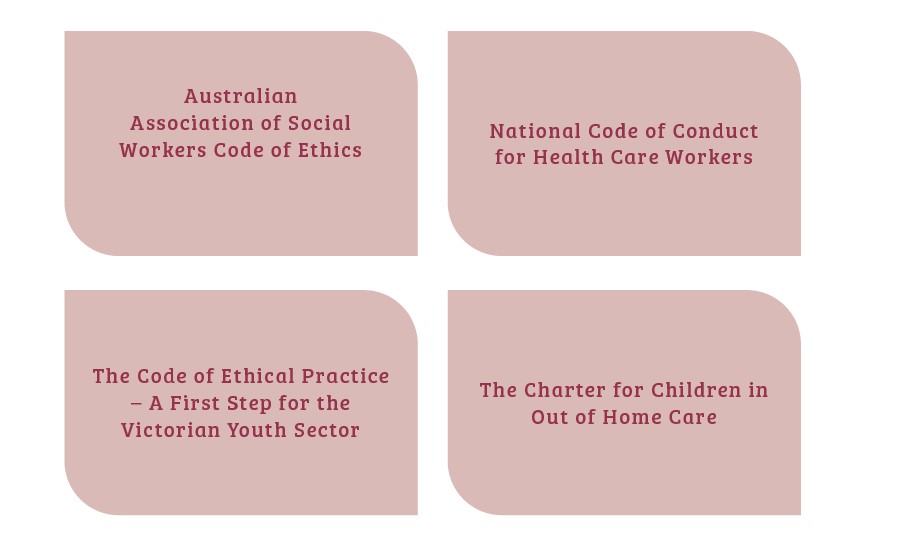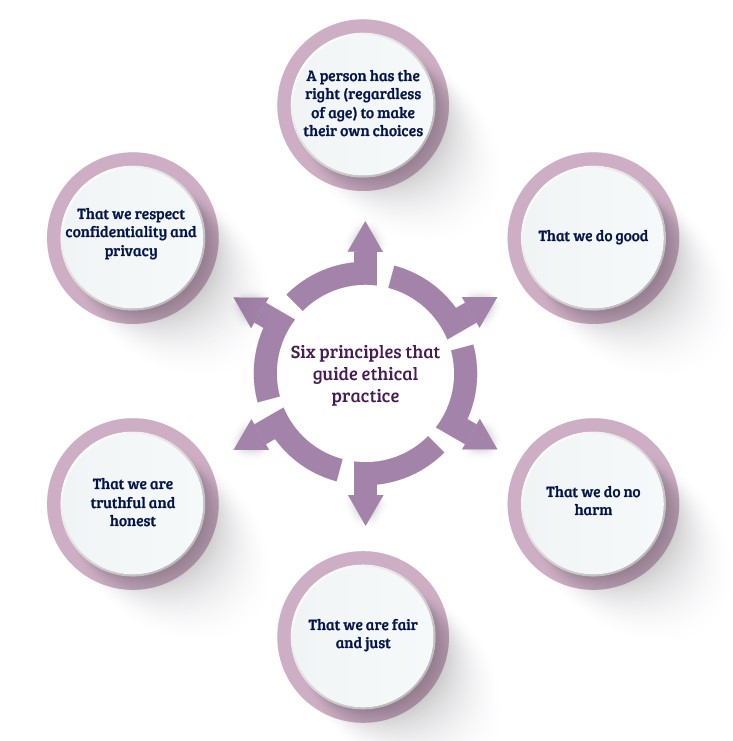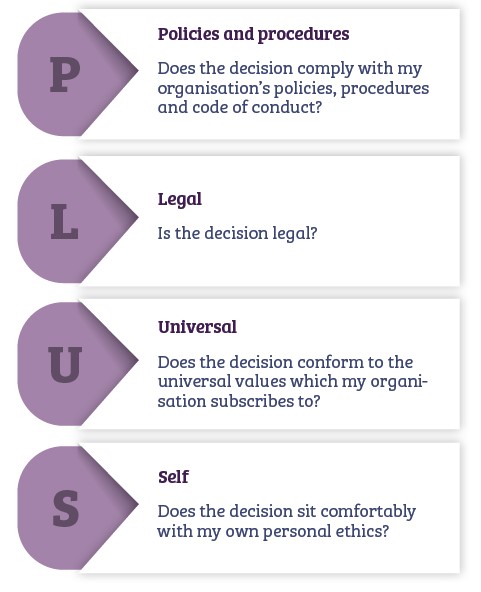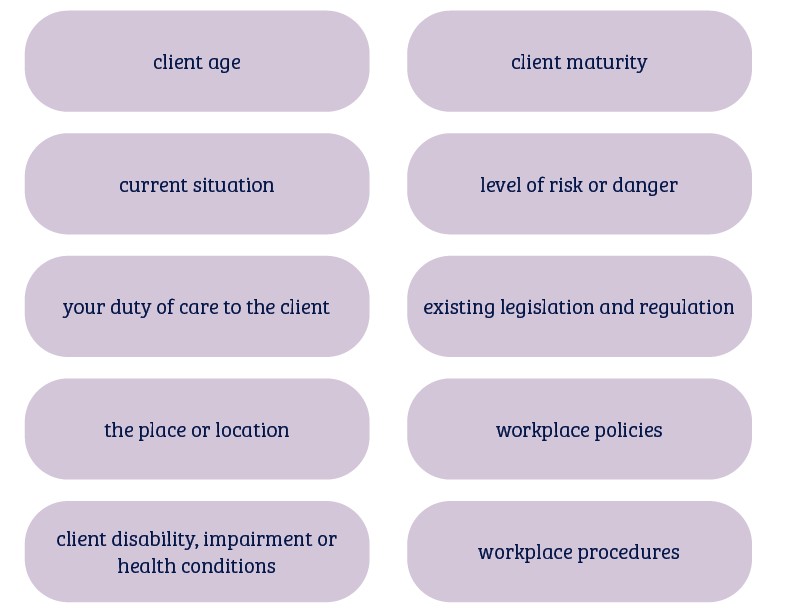Ethics are the moral principles which govern how we conduct ourselves. These moral principles are adopted by individuals, groups and professions to guide how we make decisions, interact with others and to guide how we work. Your ethical responsibilities will align closely with your legal requirements in community services.
By the end of this chapter, you will understand:
- how to identify the ethical framework that applies to your work
- how to practice ethically within a scope of practice in the community services sector
- your responsibilities to other workers, your clients and the community
- modelling of ethical behaviour in your work.
A code of ethics is a statement developed by an organisation, group or professional association which sets down its expectations regarding the way that its people work with its clients. In community services, a code of ethics is an important tool in ensuring that the people we work with have their safety and wellbeing protected. In children’s services, a code of ethics will usually guide ethical behaviour, professional boundaries and acceptable and unacceptable relationships. A code of ethics provides a framework for guiding the activities, governance, systems of work and management plans of your organisation.
Some agencies will develop their own code of ethics or code of conduct. Others will work with an established code. Here are some examples:

| Activity 2A | |
|---|---|
| ACW Code of Ethics | |
| The Australian Community Workers has a code of ethics for all people working in the community services sector field. Locate the code and take some time to read through it. Answer the following questions: | |
| 1. | Why is a code of ethics particularly important for community services workers? |
| 2. | How does this code of ethics impact the way that you think about your practice in community services? |
| 3. | How would you communicate the key elements of this code of ethics to your community services team? |
| 4. | How would you create a culture of ethical practice around the code of ethics? |
| Resource |
|---|
| You can read more about the Charter for Children in Out of Home Care here: https://services.dffh.vic.gov.au/charter-children-out-home-care |
| This is a link to the Australian Association of Social Workers’ Code of Ethics: https://www.aasw.asn.au/practitioner-resources/code-of-ethics |
| This is a link to The Code of Ethical Practice – A First Step for the Victorian Youth Sector: https://www.yacvic.org.au/assets/Uploads/The-Code-of-Ethical-Practice.pdf |
| For guidance on applying the Charter for Children in Out of Home Care, see: https://services.dffh.vic.gov.au/sites/default/files/2017-05/Charter-for-children-in-out-of-home.pdf |
Ethical Principles

You can utilise these underpinning principles to guide you in the development of your own ethical frameworks and practices, and to ensure that the policies and procedures of your organisation include an ethical basis.
Ethical Decision-Making
In both your role as a carer and as a supervisor, you will constantly be faced with ethical decisions. This is particularly true when balancing the child or young person’s right to make their own choices and with your organisation’s duty of care. Ethical questions will also arise when you are trying to balance the interests of one child or young person with those of another person.
The following are some strategies that you can use to assist you in making ethical decisions:
- Ensure that you have all of the information you need to make the decision
- Consult your organisation’s code of ethics, policies and procedures
- Seek advice
- Ensure that your decision-making process follows basic human rights (consult the Charter for Children)
- Be open and honest in your decision-making process (of course, ensure that your requirements for confidentiality are respected)
- Document your decisions and the rationale for your decisions
- Role model ethical behaviour and decision-making
- Be accountable for your decisions
| Activity 2B |
|---|
|
Applying Different Ethical Decision-Making Tools Research two different ethical decision-making tools you can use in your work. Consider the tools and how they could apply to the case study below. |
Tools for Ethical Decision-Making
There are countless tools to assist you in making ethical decisions. One commonly used tool is PLUS.
PLUS
PLUS is a tool or filter that you can apply to your decision or to a range of options to rate how ethical they are. There are four measures, as follows:

If your answer is ‘no’ to any one of these questions, then you should reconsider that option or seek further advice.
| Case Study |
|---|
| Lindsay has recently been appointed as a supervisor in a unit caring for three young people. The team of carers has been relatively stable for almost two years and the roster has been in place for approximately eighteen months. The roster gave priority for weekends off to two members of the team with young children. One member of the team that Lindsay oversees has approached her to ask if the roster could be changed to facilitate a more equal spread of weekends off. |
A scope of practice defines those tasks that you are authorised to undertake and also provides guidance as to which tasks you should seek advice on or refer to a supervisor, specialist or colleague. Many professions have a scope of practice including medical doctors, nurses, paramedics, psychologists and so on.
A scope of practice might define, for example, those positions within an organisation that can approve medical treatment, dental treatment or changes to policy.
Where Do You Fit In?
As you have seen throughout this resource, your role will regularly cross the boundary between carer and supervisor and this can sometimes make for some complex decision-making. In practice, how do you walk that line? Where do you fit in creating a home-like environment for the children and young people in your care while fulfilling your obligations as a supervisor? Everyone will have a slightly different approach, but you might find the following tips useful:
- Rely on the best-interests principles, your organisation’s policy and procedures and the legislation
- Seek specialist advice where necessary
- Always document your decisions, your decisionmaking process and your final rationale
- Keep the young person’s needs at the forefront of the process
- Avoid being pressured into a decision or applying your own emotion, background or triggers to a situation
- It is never appropriate to let your own bias guide your behaviour
- Always consider the message that your behaviour is sending the children and young people in your care and the team that you are working with. Are you role-modelling positive behaviours, facilitating positive relationships and building resilience and strengthening team bonds?
- Remember that there can be positives in conflict
- Plan for communication where possible
- Respect professional boundaries
| Activity 2C | ||
|---|---|---|
|
Managing Tensions The following table can be used to keep a record of situations where you have felt tension between your roles and responsibilities. What did you do well? What could you improve on next time? Note: Remember to de-identify your examples so as to protect the privacy of those involved in your examples. |
||
| Situation: Tension between the needs and rights of the child/young person in care and the needs and rights of that young person's family | ||
| Example | What did I do Well? | What would I do differently next time? |
| Situation: Tension between a young person's right to privacy and their safety | ||
| Example | What did I do Well? | What would I do differently next time? |
| Situation: Tnesion between your role as a career and your role as a supervisor. | ||
| Example | What did I do Well? | What would I do differently next time? |
There are two terms that you will hear a lot while working in the community services sector: human rights and human needs. What do each of these mean and how do they relate to each other?
There has been much work done on human needs and there are many definitions and theories. The one thing that the majority of these have in common is that the term human needs refers to those basic needs that an individual needs to survive, including food and water, shelter, safety and so on. While the thinking around what those needs are varies (love, education, attachment, etc.), the fundamental premise that an individual has a set of needs to survive does not.
While human needs refer to the needs of an individual, human rights encompass the relationships and meeting of needs between people.
Human rights recognise the inherent value of each person, regardless of background, where we live, what we look like, what we think or what we believe. They are based on principles of dignity, equality and mutual respect, which are shared across cultures, religions and philosophies. They are about being treated fairly, treating others fairly and having the ability to make genuine choices in our daily lives. Respect for human rights is the cornerstone of strong communities in which everyone can make a contribution and feel included. Australian Human Rights Commission
Mandatory Reporting Responsibilities
In Australia, every state and territory has laws which mandate the reporting of suspected child abuse and neglect. These laws vary significantly from state-to-state regarding who is required to report, how they are required to report and when. It is critical, however, that you are familiar with your state or territory’s laws as well as your organisation’s policy and procedures around mandatory reporting. As a support worker, you will have responsibilities concerning the safety for the children and young people in your care and, as a supervisor, your level of responsibility will be higher again. You will have a role in ensuring that policies and procedures are implemented and adhered to by your team as well as supporting your team members to report if required.
It is vital that you consider both your legal and ethical responsibilities regarding mandatory reporting in relation to your own role in the workplace.
| Case Study |
|---|
|
Reuben has recently started as the supervisor at a new unit. One of the carers, Tarquin, asks to speak to Reuben about some concerns that he has regarding Nabitha, one of the young people in his care. Nabitha, who is thirteen, is normally fairly reliable about coming straight home from school but over the last month or so, she has been arriving later and later and, during the last week, has missed dinner twice. She told Tarquin that she has been meeting a group of friends at a local convenience store where they have a slushie and hang out for a while. Tarquin was not initially too concerned but discussed it with his former supervisor who told him not to worry about it and to ‘pick his battles.’ Tarquin, however, started to get a sense that some of this group of ‘friends’ had cars and so he became increasingly concerned and went back to his supervisor who brushed him off with an ‘I told you not to worry.’ The reason that Tarquin has asked to speak to Reuben this time is that he overheard Nabitha mention a twenty-seven year-old ‘boyfriend’ to one of the other kids in the house. Making reference to your organisation’s policy and procedures, and the relevant legislation, how would you advise Reuben to proceed? What support should Reuben offer to Tarquin if there is a report made? |
| Resource |
|---|
| The following link has information relating to mandatory reporting in your state or territory. Follow the link and access the relevant information and then compare it with your organisation’s related policy and procedure’s: https://aifs.gov.au/resources/resource-sheets/mandatory-reporting-child-abuse-and-neglect |
Privacy, Confidentiality and Disclosure Responsibilities
In the course of a day, in many organisations, a vast amount of personal information is exchanged about people. The data might relate to employment details, spending habits, online viewing habits, income, taxation, health, business interactions, banking, sporting clubs, dating, identity and so on. The list is almost endless. With the advent of information technology, it is easy to collect, store, manipulate, access and share this information with others.
Private information is now a commodity and there are obviously many implications for individuals and for organisations as a result of this. Legislation has been developed to protect individuals and to help us have control over our own information. There are also privacy standards (or principles) to guide organisations in how information is used.
The privacy principles can guide you in making ethically sound decisions as well as complying with the law.
What is Personal Information?
Personal information is information about an individual that identifies them or which might allow for their identity to be easily worked out. It can include a person’s name, home address, mailing address, email address, marital status, financial information, medical information, ethnicity and religion.
The Australian Privacy Principles
In March 2014, the Australian government introduced a set of 13 privacy principles (The Australian Privacy Principles or APPs) which govern how personal information is managed by government agencies and by private organisations with an annual turnover of more than $3 million dollars. In some cases, the APPs also apply to organisations with an annual turnover of less than $3 million dollars (for more information about whether or not your organisation is required to adhere with the APPs, you should seek professional advice). The APPs replaced the National Privacy Principles (NPPs).
The Privacy Act
The Privacy Act 1988 is the Australian legislation which regulates the way that organisations handle individuals’ personal information. This includes the way that information is collected, stored, distributed, used, accessed and corrected. The Act includes the 13 APPs.
The Privacy Act also legislates the use of tax file numbers, health and medical information, credit reporting and allows for privacy regulations to be made.
The Privacy Act was updated by the Privacy Amendment (Enhancing Privacy Protection) Act 2012. There were many significant changes made to the Act which came into effect in March 2014.
| Resource |
|---|
| Comprehensive information about the Privacy Act can be found at: https://www.oaic.gov.au/privacy/the-privacy-act |
Disclosure
One area that people working in community services often find difficult is finding a balance between managing your privacy and confidentiality responsibilities, ensuring that the best interests of the children and young people in your care are met and that disclosures are dealt with sensitively and appropriately.
Confidentiality
Confidentiality is a critical aspect of working with clients in community services. The need to maintain confidentiality of information will depend on factors such as:

The importance of positive role-modelling in the way you practice ethically in a community services context cannot be overstated. It is important not only in demonstrating to the children and young-people in your care that there are constructive ways to communicate, interact and behave, but also to their families, to the members of your team and to all of the other people that you interact with and with whom they see you interact.
Most workplaces adopt a code or set of principles that guide ethical practice. This code can be used as a tool for supporting your own ethical behaviour and the way in which you model this for other workers. You can use a set of questions to support your decision-making and role-modelling:
- Would my actions be consistent with my organisation’s ethical principles?
- What would a reasonable person think about my actions?
- Am I personally comfortable with the course of action?
- Do I have all of the facts?
- Have I reviewed and considered the facts carefully?
- Would my action(s) reflect negatively or positively on me and/or on my organisation?
- Could someone’s life, health, safety or reputation be negatively affected by my actions?
- How would WHO be affected if this action became public knowledge?
- Would it breach a staff or financial regulation, rule or policy?
- Is there an alternative action that does not give rise to the same concerns?
These questions have been adapted from those used by the World Health Organisation to guide their staff in ethical decision-making. You could display or share a set of similar questions with your own work team. Encourage them to think and discuss ethical decision-making openly and honestly, using the questions as a base. This reinforces the notion that ethics are not simply something which occur without thought, but rather are the result of careful, considered internal or external discussion and debate about the merits of taking a particular course of action.
The approach of ‘thinking out loud’ and taking other workers through your steps in decision-making is a useful way of role-modelling ethical behaviour and responses in community services.
| Activity 2D |
|---|
|
Posing Questions and Sharing Ideas Organise a meeting or discussion group centred around an ethical dilemma related to community services. Use the questions above adapted from the WHO Code of Ethics and Professional Conduct to consider the dilemma. Decide on a course of action and make notes about your decision and reasons for it. Remember to use fictitious or de-identified information if discussing client information for this activity. Use a virtual meeting or face-to-face meeting to suit your current learning needs. |
Strategies
There are many strategies for role-modelling positive behaviours, including:
Walking the Walk
Role-modelling positive practices and communication is important as it reinforces best practice to your team and demonstrates and reinforces skills for the children and young people in your care.
Being Respectful
Respect the knowledge and skills of others, acknowledge and recognise good practice and implement it into your own practice. Be respectful of all of those around you (including their culture and lived experiences).
Sharing Experiences
Share your experiences with members of your team. What has worked well in making sound ethical decisions (and not so well)? What did you learn from those experiences? Remember that sharing involves listening as well as talking!
Seeking Feedback
Seeking feedback in a variety of forms (casual, formal and informal) and from a variety of sources (colleagues, supervisors, children and young people, members of your team, specialists and other members of the care team) helps you to identify strengths to pass on and areas to work on.
Reflecting
Great workers and leaders continuously reflect on their performance. What did I do well? What could I have done better? Role-modelling continuous improvement helps to create a culture of continuous improvement. If you have made a poor ethical decision, make sure you learn from it. Take the time to write, draw, make notes or think clearly about what happened and what you will change going forward.
Think about yourself as a role-model currently. What do you do well? What could you improve? What would your team say about the way you work and your standard of ethics? What would your supervisor say about the way you operate as a leader or worker?
- Remember that it is important that you role-model positive ethical behaviour in:
- Thinking carefully about decisions
- Remembering that others are watching, learning and listening
- Open and honest decision-making
- Making time for decisions to occur purposefully
| Review Questions | |
|---|---|
| Use the following questions to check your knowledge | |
| 1. | Identify the six principles of ethical practice. |
| 2. | Analyse how you would use a source of information about ethics in your own work activities. |
| 3. | Describe how you would use one ethical principle to guide your decision-making in community services practice. |
| 4. | Outline one approach you could use to role-model positive behaviours in the workplace. |
